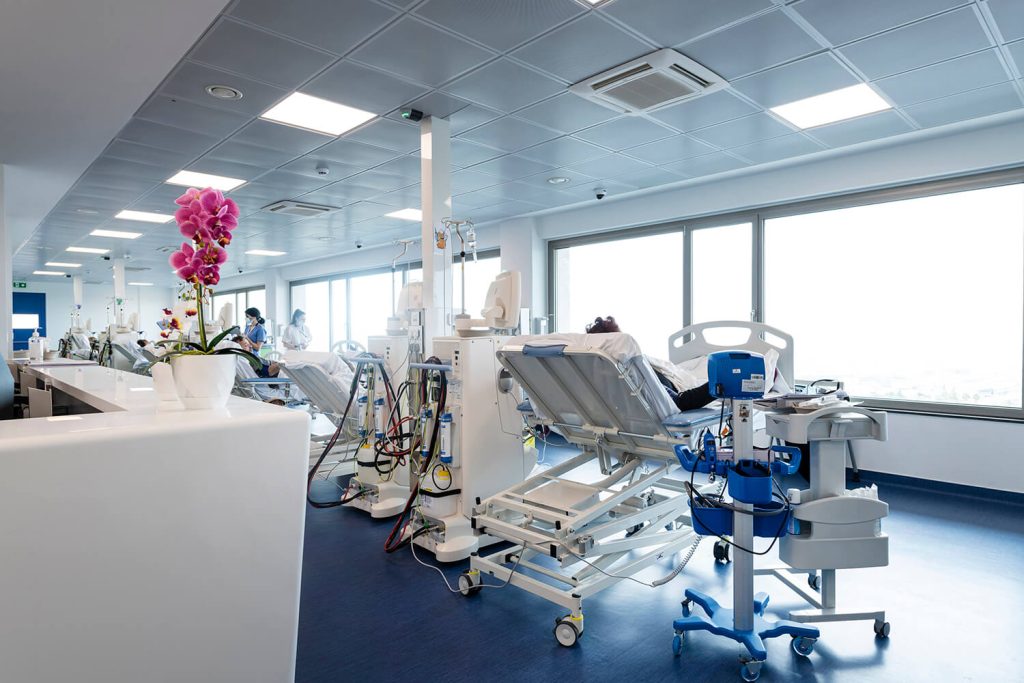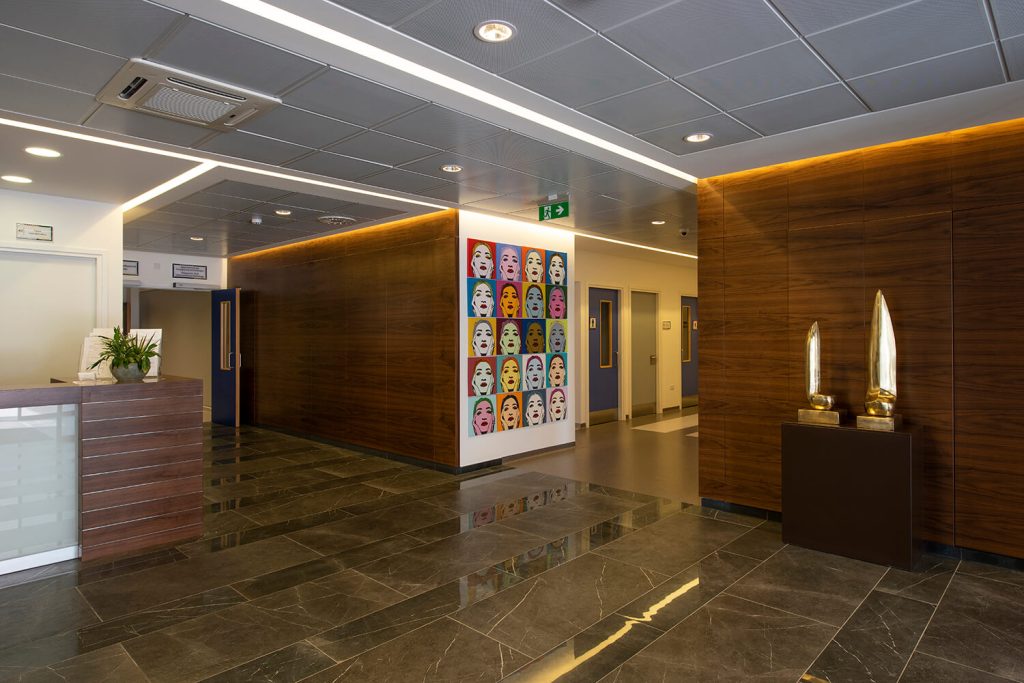Nephrology
About
People first. Everyday.
The priority of the Department of Nephrology at the German Medical Institute (GMI) is the creation of an individualized and holistic treatment program, tailored to the specific needs of each of our patients with the goal of ensuring a high-quality experience for our patients, including those undergoing dialysis.
This department’s mission is to improve the health, well-being and thus the quality of life of every patient on dialysis or with other kidney-related health problems by setting the highest standards every day. Our vision is a complication-free dialysis treatment that acts as a suitable substitute for renal health.
To accomplish our mission and vision, we apply technological and medical practices that are of the utmost importance and validity to patients. We combine optimal dialysis treatment with a simultaneous focus on patient wellness, autonomy, and self-care. We collaborate with other departments at GMI, including the departments of integrative medicine (nutrition, physiotherapy, occupational therapist, acupuncture), clinical psychology, vascular surgery, interventional cardiology, radiology and many others.
Our goal is to help our patients enjoy the quality of life they desire. Every day.
Our core values guide us in our daily work as we strive to achieve our purpose.
Welcome to the Department of Nephrology at the GMI.
Toulkeridis Giorgos
The GMI Dialysis Unit
The GMI uses the best equipment available to ensure safe and unrivaled dialysis services. Our dialysis unit is equipped with 27 machines for 21 stations, one of which is in isolation. The unit is equipped with Fresenius Medical Care 5008S, which are the best and most technologically advanced dialysis machines that the world leading German dialysis products manufacturer has to offer. Beyond their excellent specifications and capabilities, they are also environmentally friendly.
The machines feature leading (OCM) technology for online monitoring. This is the most advanced technology in the field of dialysis. The machines monitor critical dialysis factors in real time.
The TDMS software works to monitor and record dialysis information and link it directly to the patient's medical record. It even connects wirelessly to the scales and electrolyte analyzer, updating the patient's record automatically. The virtual patient record is a technological innovation that offers unlimited possibilities to medical staff for the benefit of each patient.
The dialysis water treatment system is manufactured by Fresenius, which ensures top level water quality control.
The unit has state-of-the-art cardiographs, ultrasounds, and biochemical analyzers.
The beds can be converted into chairs, giving patients the comfort and freedom to use them as they wish.
Dialysis is a process where a dialysis machine and a special filter called an artificial kidney are used to clean the blood. For the blood to enter the dialysis machine, access through either a catheter or an arteriovenous anastomosis is needed. The types of dialysis are:
Hemodialysis (HD):
Blood purification is achieved by moving the blood at a specific flow into the dialysis filter and simultanegusly moving the dialysis solution into the filter with
reverse tow. it helos in the remova or many ow molecular weignt substances.
- Hemofiltration (HF):
Blood purification is achieved as a quantity of the patient's blood plasma is passed through the filter and simultaneously replenished in equal quantity by the machine with a dialysis solution. It helps in the removal of mainly medium molecular weight substances.
Online Hemodiafiltration (HDF):
This is the latest method of dialysis treatment. It is a combination of the two methods above. That is, we have both movement of blood with reverse from the solution into the filter and simultaneous removal of plasma with its replenishment.
It helps in the removal of small and medium molecular weight substances.


The Department
The Department of Nephrology operates a daily clinic for outpatients. The whole range of nephrological diseases is monitored: diabetic nephropathy, glomerulopathies, chronic kidney disease, hereditary kidney diseases, systemic diseases with renal involvement, investigation of nephrolithiasis and others.
The GMI operates an integrated dialysis unit with the ability to apply all modern and specialized techniques.
You will be impressed by the space, staff and technology available at our new state-of-the-art dialysis unit at the GMI from your very first visit.
Our expert staff is fully capable of providing the best dialysis treatment.
The GMI dialysis department keeps abreast of the changes and new technologies that are emerging worldwide in the field of dialysis. We implement and/or develop them with safety and quality as the primary objective.
The Department of Nephrology is staffed by nephrologists and support staff of the department. Our nephrologists examine, evaluate, and prescribe treatments (dialysis, intravenous medication, etc.). Our nurses carry out the instructions from the nephrologists, monitor the patients' condition during their treatment, and connect and disconnect the patients to the dialysis machine and record both vital signs and machine parameters.

Equipment
The GMI is equipped with the most modern medical equipment.

Research
Lorem ipsum dolor sit amet, consectetur adipiscing elit. Pharetra volutpat faucibus orci erat erat ultrices vehicula tristique. Nunc dolor nisl dis risus amet lacinia integer. Neque auctor fames duis pellentesque nisl in. Arcu nulle alquam DivInar susciDit phasells et insum
FAQs
Chronic kidney disease (CKD) is a term used to describe kidney damage or reduced kidney function (regardless of cause) that persists for more than 3 months.
Sometimes, CKD leads to kidney failure or end-stage renal disease (ESRD), which requires dialysis or a kidney transplant to keep you alive.
End-stage renal disease (ESRD) is total and permanent kidney failure. When the kidneys are completely failing, the body retains fluids and harmful waste builds up.
If you have ESRD, you will need dialysis or a kidney transplant to stay alive.
There is no cure for CKD or ESRD. However, there are ways to manage CKD and ESRD that can help those with these diseases live full, productive lives. If you have CKD, it is important to get regular checkups. With early diagnosis and treatment, you may be able to slow the progression of your disease.
Simply put, dialysis is a way of cleaning your blood. It is a medical treatment for people with ESRD that does some of the work that healthy kidneys would do, such as:
- Removing waste, salt, and excess water from your body.
- Adjusting the balance of your body’s fluids.
- Helping control your blood pressure.
The National Kidney Foundation (NKF) guidelines recommend that you start dialysis when your kidney function drops to 15% or less, and/or if you have severe symptoms caused by your kidney disease, such as shortness of breath, fatigue, muscle cramps or nausea and vomiting. Your doctor will help you decide if dialysis is appropriate for you, based on your symptoms and kidney function tests.
The usual schedule for dialysis treatments is three times a week. The length of your treatment depends on what is prescribed. Usually, treatments last 3-4 hours.
You should make sure you have adequate medication and access to a dialysis unit.
One of our specialists can help you plan and arrange services for all your dialysis needs before your travel, from finding centers to booking a treatment location.
What you should eat, and how much, depends on the stage of CKD you have and how well your kidneys are working. Consult with your doctor or our institute’s nutritionist to find out the specific nutritional requirements for your kidney condition.
In general terms, regarding your diet, you will need to:
- Reduce protein intake, especially if you have stage 3 or 4 CKD.
- Keep salt to a minimum – sodium can have a negative effect on your kidneys and increase your blood pressure.
- Watch out for phosphorus too – it’s a mineral found in many foods and helps control your heart rate. When you have CKD, too much phosphorus can build up in your kidneys.
You will probably feel very tired and may have feelings of depression. But it is important to know that while dialysis can affect your sex life, it does not end it.

Contact details
- (+357) 25 208 000
- [email protected]
- 1, Nikis Avenue 4108, Agios Athanasios, Cyprus
- Mon - Fri | 08:00 - 16:30



